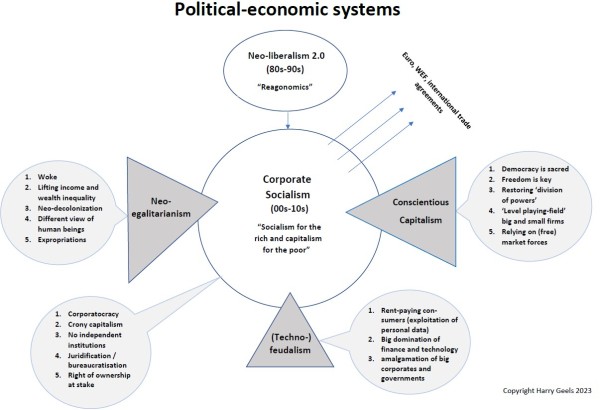Harry Geels: The rise of neo-feudalism
Harry Geels: The rise of neo-feudalism

This column was originally written in Dutch. This is an English translation.
By Harry Geels
The current system is no longer sufficient for many people. That is why a lot is being written about system changes these days. Previously I wrote about neo-egalitarianism and a more conscientious form of capitalism in response to the current 'corporate welfare state'. But there is another important political-economic development: neo-feudalism.
There is a lot of writing and debate going on right now about system change, because the current system is not sufficient for most. In particular, the great inequality, the government's social interference in more and more areas, the depletion of the earth and the associated climate transition, which is considered necessary, are cited as reasons for changing society. The question is what kind of system we are in now and what counterforces we already see emerging in response to its alleged poor functioning.
Current core: the 'corporate welfare state' a.k.a. 'corporate socialism'
I have previously used Figure 1 (in slightly modified form) in a podcast. It indicates that the current system, which can best be described as a corporate welfare state or corporate socialism, is a further development of neo-liberalism 2.0, or Reagonomics, which has emphasized personal freedom, the right to own property and entrepreneurship, and less regulation. Initially, Reagonomics turned out well. In the 1980s and 1990s it resulted in greater prosperity for almost everyone. But the system eventually got stuck.
Figure 1: Political-economic systems

The system we know now, corporate socialism, which I have described in detail here, is different from neoliberalism 2.0, because the large corporations now dominate, there are conflicts of interest between large companies and the government and smaller companies and consumers are in danger of being snowballed by a ever-increasing bureaucratization, financialization and legalization of society. Freedoms and the right to own property are further undermined and there is little left of the separation of powers. (International) powers have emerged that influence society, such as the UN and WEF.
The current system is also inadequate because, in short, care is mainly taken for the people who have good positions in the large companies and less for the lower layers, who often have to compete internationally with workers from low-wage countries. Other forces have therefore also emerged, based on the principle that 'every action is followed by a counter-reaction' (and not based on the principle that there is some higher, elite power that determines everything). Two of those systems are a real counter-reaction (1 and 2), the third can be more of a further development.
Counter-reaction 1: Conscientious capitalism
The first counterforce comes from capitalism itself. Here the market order must dominate again, especially because the government does not function efficiently (an open door of course). There must be sufficient competition between companies again. There are now oligopolies in too many sectors that are detrimental to consumers. More attention must be paid to a fair playing field between large and small companies and large companies and consumers. The separation of powers must be restored. And there needs to be more emphasis on ethics.
Counter-reaction 2: Neo-egalitarianism
The second movement comes more from the left (if the division between right and left in politics still exists). The government must take more control, because capitalism would have failed. The focus is more on equality of incomes, assets and gender. The climate must be saved through a 'major redistribution' and, if necessary, with negative economic growth. If saving the climate requires further abandoning democracy or property rights, then that is open to discussion. Neo-decolonization is also high on the agenda here.
(Counter)reaction 3: Neo-feudalism
Neo-feudalism, as mentioned, cannot be regarded so much as a counterforce, but as a further development of the corporate welfare state, just as the latter was a further development of neo-liberalism 2.0. Former finance minister of Greece during the euro crisis, Yanis Varoufakis, states that neo-feudalism already exists and has very recently written a book about it. The Guardian published an interview with him on September 24, mainly about this book. Varoufakis rightly states that there is no longer capitalism.
According to Varoufakis, in neo-feudalism, consumers pay fixed fees to Bigtech (and Financials). This can be in the form of monthly subscriptions (for example, as with Microsoft) or the commercial exploitation of (giving away 'free') personal data (including surfing and online purchasing behavior). This is then tolerated by the government, which works with these 'corporate landlords', sometimes to push its own agenda, sometimes to benefit from (digital and financial) favors from them. I think that Varoufakis is going a bit too fast with his stimulating vision that neo-feudalism is already 'completely' running. There are, as described above, two opposing forces that have not yet given in.
Below (without further value judgement) is a quote from the Guardian interview.
‘We’re now in servitude to the fiefdoms of our new global masters, Lord Zuckerberg of Facelandia and Sir Musk of the rotten borough of X. Imagine the following scene straight out of the science fiction storybook. You are beamed into a town full of people going about their business, trading in gadgets, clothes, shoes, books, songs, games and movies. At first everything looks normal. Until you begin to notice something odd. It turns out all the shops, indeed every building, belongs to a chap called Jeff (Bezos). What’s more, everyone walks down different streets, and sees different stores because everything is intermediated by his algorithm… an algorithm that dances to Jeff’s tune. It might look like a market, but it’s anything but. Jeff doesn’t produce capital. He charges rent. Which isn’t capitalism, it’s feudalism. And us? We’re the serfs. 'Cloud serfs', so lacking in class consciousness that we don’t even realize that the tweeting and posting that we’re doing is actually building value in these companies.’ -Yanis Varoufakis
This article contains a personal opinion from Harry Geels
PS: Of course not everything is black or white, mixed forms are also possible, open for discussion.








